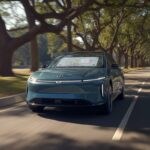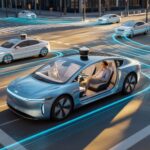
Recent developments in the electric vehicle (EV) industry, as reported by Reuters, include a variety of significant events and strategic moves by major players in the sector:
- General Motors (GM) Investment and Worker Compensation: GM has outlined plans for investments centered around electric vehicles and has committed to raising wages for a large number of U.S. hourly workers. This move reflects the company’s push towards electrification and the growing importance of EVs in their future strategy.
- BYD’s Expansion into Europe: Chinese EV maker BYD is set to build its first European plant in Hungary, as reported by Frankfurter Allgemeine Sonntagszeitung. This marks a significant step for BYD in terms of global expansion and the increasing competition in the European EV market.
- Joint Ventures for Battery Production: Companies like Cummins, Daimler Trucks & Buses US Holding, and PACCAR have formed a joint venture named Accelera to advance battery cell production in the United States. This collaboration is indicative of the industry’s focus on securing battery supply chains and enhancing production capabilities domestically.
- Lucid’s Price Strategy Amid EV Price Wars: Lucid Group has temporarily cut prices of its Air range of luxury sedans to stay competitive during a period of intense price competition and slowing demand for electric vehicles.
- Stellantis and Foxconn’s Semiconductor Venture: Stellantis has partnered with Foxconn to create a joint venture that will design and sell semiconductors for the automotive industry starting from 2026. This is a strategic move to address the semiconductor shortage that has recently impacted the automotive industry, including EV production.
- GM and POSCO Investment in Canada: GM and South Korea’s POSCO Future M are increasing their investment to expand production capacity at their chemical battery materials facility in Canada, with the total investment estimated to exceed $1 billion.
These developments highlight the dynamic nature of the EV industry, with major automakers and tech companies making significant investments and strategic partnerships to bolster their positions in the rapidly growing market for electric vehicles.
- John Goodenough’s Passing: The industry mourned the loss of John Goodenough, a Nobel laureate and a pioneer in the development of lithium-ion batteries, which are crucial to the current generation of EVs. His contributions have been fundamental to the advancement of electric vehicle technology.
- Electric Aviation Developments: Surf Air Mobility, an electric aviation and regional air travel company, announced that it expects its shares to start trading, marking a significant event for the electric aviation sector and its role in the broader EV industry.
- Stellantis’ Labor Agreements: Stellantis has made headlines with its labor agreements, which include significant raises and billions in investments, signaling a strong commitment to its workforce and future developments in EVs.
- E-Fuels and EU Regulations: There has been a debate within the European Union regarding the future of e-fuels and their role in achieving CO2-free mobility, with Germany expressing opposition to a law that would end sales of CO2-emitting cars by 2035 unless they run on e-fuels.
- Tesla’s Market Movements: Tesla has been part of several news stories, from dealing with competition and market share dynamics to addressing technical challenges with EVs and the management of battery life and recycling.
- Advancements in Charging Infrastructure: Tesla received a significant order from BP’s EV charging unit for ultra-fast chargers, indicating ongoing improvements and expansions in the EV charging infrastructure, which is critical for the adoption of electric vehicles.
These pieces of news reflect the multifaceted developments in the EV industry, from technological advancements and market dynamics to regulatory debates and infrastructure expansion.
The industry is rapidly evolving, with traditional automakers and new entrants alike pushing forward with innovations and strategic initiatives.
The specific details about Tesla’s $100 million ultra-fast charger order from BP’s EV charging unit are not provided in the content retrieved.
However, this development is indicative of the growing collaboration between traditional energy companies and electric vehicle manufacturers to expand the EV charging infrastructure.
The move by BP to order ultra-fast chargers from Tesla suggests a significant investment in the future of electric mobility, aiming to make EV charging more accessible and convenient, which is a critical factor in the adoption of electric vehicles.
This also reflects Tesla’s expansion beyond car manufacturing into energy solutions, including charging infrastructure.


